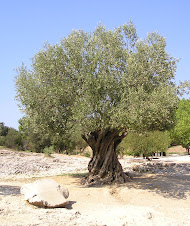


Our olive picking today was scheduled to be at a Palestinian olive grove that is now within the fence of a settlement in Beitar Illit, a half an hour south of Bethlehem. There are 38,364 settlers living in this settlement in the heart of the West Bank. The owner of the olive grove had talked to the private security guards earlier in the week to schedule the harvest of the grove, but when we arrived in the bus the guards didn’t know what to do. First they said no, then the captain came and said yes, then the police came and said no, and then the Israeli Defense Forces came and said yes to harvesting some of the farmer’s trees outside the fence, then said no and made us get back on the bus, and then after discussing it some more they did let us harvest outside the fence. And so we sat on the bus for a couple of hours, getting off when they said yes, only to return when the said no a few minutes later.
Settler’s from the settlement came out and watched the proceedings at the checkpoint. A journalist and camera crew from Al Arabiya News has been with us this week following our harvesting tour. They kept the cameraman busy with questions about what was on his tape, and told him he could go in if he erased his tape, including the previous interviews on them. Of course, he said no. Some of the settlers came over and watched us do the harvest along with the soldiers. Some of the settlers gave interviews to the journalist while we did the harvesting, giving their views about how the land belongs to the settlers, even though their houses have been built on privately owned Palestinian land. One settler mentioned that the Palestinians will all be expelled from the state of Israel, to Saudi Arabia or Iraq, even those who own their homes and orchards across the street in the town of Han. When the Palestinians leave, this land will be ours as promised in the Torah. Another settler said that “the settlers inside there are out of their mind, so don’t send the harvesters in there or the settlers will kill them.”
Abu Najy, the landowner has been assaulted by settlers four times while working on his trees within the settlement. Another time settlers have come and broken the windows and dented the sides of his car. Abu Najy was offered some 15 million shekels (over $4 million) for his land, but he refused. Still, the settlers treat his land as their own. Some of his Arab neighbors who own part of the land that the settlers have built upon are now day laborers, working for the people who have stolen their land. One such worker came over to the bus to thank us for our witness, but shared his sadness that our presence cost him a day’s work because they closed the checkpoint to all day laborers. Despite the fact we couldn’t help the farmer with his harvest, we found that our presence reminded those around us, both Israeli and Palestinian, of the injustices happening on a daily basis. It seems that there is no such thing as respect for the rule of law here, and no implementation of International Law. The Israeli Civil Administration has established two set of laws: one for Jews and another set that is far more restrictive for the Palestinians.

No comments:
Post a Comment